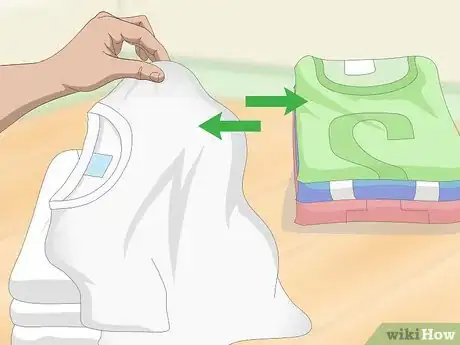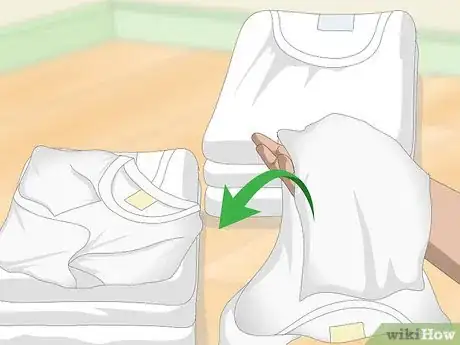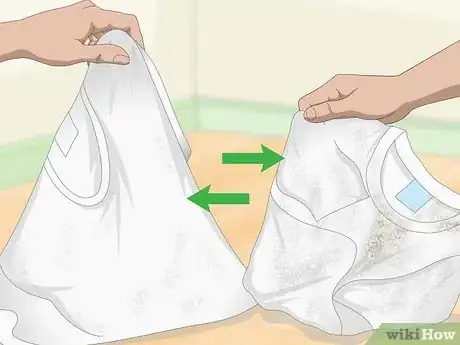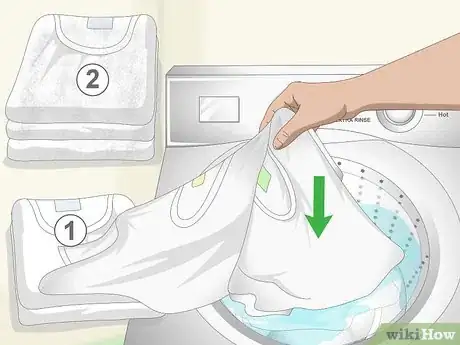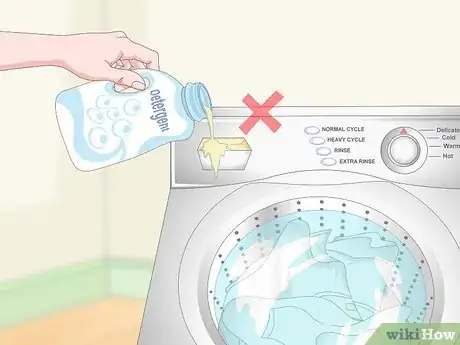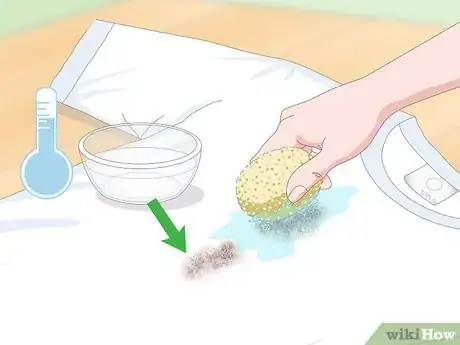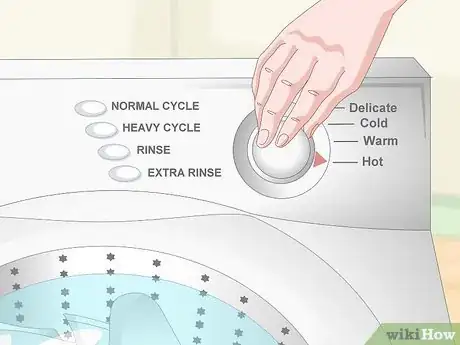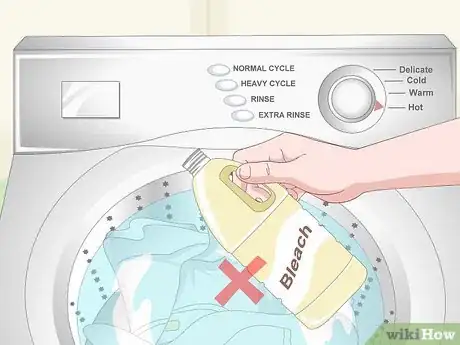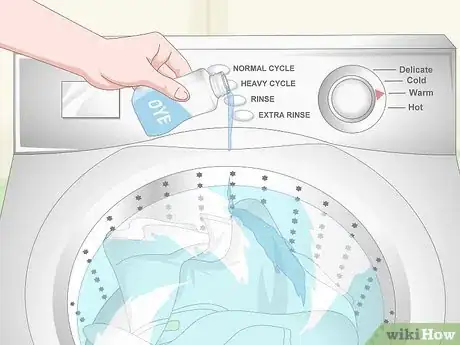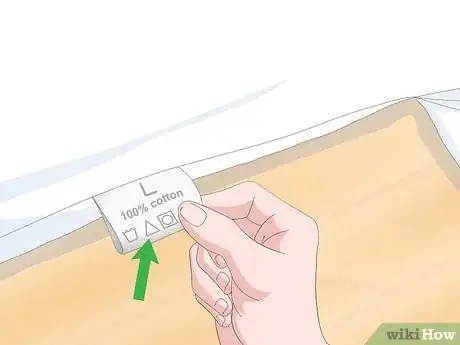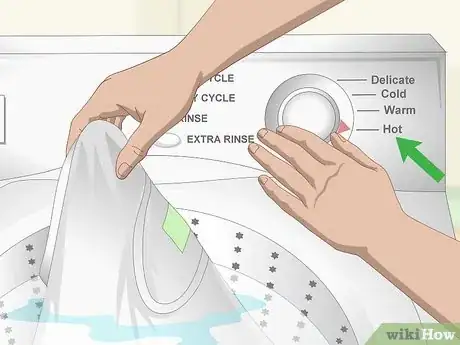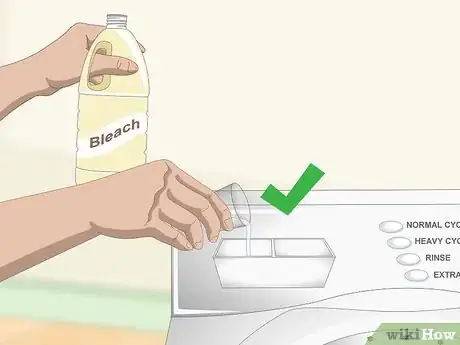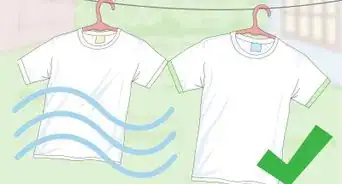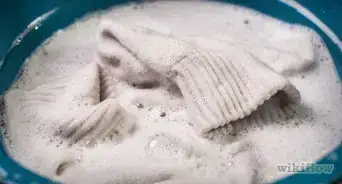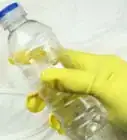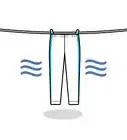This article was co-authored by Susan Stocker. Susan Stocker runs and owns Susan’s Green Cleaning, the #1 Green Cleaning Company in Seattle. She is well known in the region for outstanding customer service protocols — winning the 2017 Better Business Torch Award for Ethics & Integrity —and her energetic support of green cleaning practices.
There are 7 references cited in this article, which can be found at the bottom of the page.
wikiHow marks an article as reader-approved once it receives enough positive feedback. In this case, 93% of readers who voted found the article helpful, earning it our reader-approved status.
This article has been viewed 217,736 times.
White clothes are more prone to becoming stained, discolored, and yellowed than lighter or darker clothing. As a result, it can be relatively challenging to keep these clothes white! Fortunately, by knowing how to properly sort and run your clothes in the washing machine, as well as how to bleach them safely, you can wash white clothes without diminishing their overall quality and appearance.
Steps
Sorting and Separating Whites
-
1Separate out your white clothes from clothes with any colors on them. Whites should always be washed separately from other clothes to prevent colors from transferring to and staining them.[1] Make sure to separate out any whites with colors on them as well, to keep them from bleeding onto all-white clothes.[2]
- Even lightly colored clothes (like beiges and pastel colors) can bleed into your whites. Make sure to separate these clothes from your whites, too.[3]
-
2Sort your whites by fabric type to wash them in different temperatures. Put all of your sturdy fabrics, towels, jeans, cottons, and clothes containing manmade fibers into one pile. Then, put all your delicate fabrics, including silk, lingerie, Spandex, and activewear, into a different pile. You'll wash your sturdy fabrics in warm water and your delicate fabrics in cold water.[4]
- Fabric type will also determine what laundry setting your clothes should be washed on. Wash your sturdy fabrics on Quick Wash or Heavy Duty if they’re heavily soiled and wash your delicate fabrics on Delicates or Hand Wash.
- Sorting your fabrics this way allows you to wash your clothes at the hottest temperature they can tolerate without being damaged.
Tip: If you aren’t sure how to sort an item, check its tag. Tags and clothing labels provide washing instructions for water temperature, washing cycle, and whether or not you can use bleach.
Advertisement -
3Divide your sorted whites into additional piles based on filth level. Place heavily soiled clothes into one pile, moderately dirty clothes into a second pile, and relatively clean clothes into a third pile. This prevents dirt, food, and other debris on soiled white clothes from staining other white clothing.[5]
- For example, if a white shirt is caked with mud after spending an afternoon gardening, separate that particular shirt from cleaner, brighter-looking whites.
-
4Wash each pile of clothes separately, one at a time in the machine. Run the washing machine on the appropriate settings for each pile. Then, dry your clothes in the dryer as you normally would.[6]
Keeping Your Whites from Fading
-
1Don’t use more detergent than what the instructions recommend. Use the laundry detergent cap to add the precise amount of detergent to your load based on packaging instructions. Using excess detergent can lead to filmy buildup that attracts more dirt and is more noticeable on white clothing.[7]
- The amount of detergent you should use depends on load size and on the strength level of your detergent brand.
- At the same time, don’t use too little detergent to wash your clothes. Follow the manufacturer’s instructions as closely as possible to get the best possible clean for your white clothes.
- If you want to wash your clothes with vinegar in addition to detergent, only add the vinegar during the rinse cycle after the detergent is out. Otherwise, your clothes will end up oily.[8]
-
2Treat stained whites with cold water before washing them. Use a sponge or washcloth dipped in cold water to scrub stains from coffee, wine, or blood. Vigorously scrub the stains, then let the clothing sit for about 15 minutes before washing it.[9]
- Do this as soon as possible after staining the piece of clothing for best results.
- Don’t use hot water on stains– it may actually cause them to set, which will ruin your white clothes.
Tip: If your clothes have armpit stains, soak them in white vinegar for about an hour before throwing them in the washing machine to remove the stain.
-
3Use the hottest water that you can for the fabric type you’re washing. Hot water is more effective at killing germs and bacteria, as well as preventing white clothes from fading. Wash your heavily soiled clothes in hot water, your sturdy fabrics and moderately soiled clothes in warm water, and your delicate fabrics in cold water.[10]
- Make adjustments to water temperature as needed based on care labels to prevent clothes from shrinking or becoming misshapen. For instance, clothing made from nylon, spandex, lycra, and certain cotton blends may shrink in hot water.
-
4Avoid using bleach on fabrics other than cotton. Bleach typically helps whiten clothes, but chlorine- and oxygen-based bleach brands can weaken some fabrics and lead to white clothes looking gray or yellow. If you want to bleach an artificial fabric, substitute bleach with household ingredients that have natural bleaching properties, such as 1⁄2 cup (120 mL) of either lemon juice, white vinegar, baking soda, or hydrogen peroxide.[11]
- These ingredients also make whites whiter without the added risks of toxicity and skin irritation.
-
5Add bluing agent to your laundry load to make your whites look whiter. Bluing agent formulas make whites whiter by releasing a small amount of blue dye to the water, which paradoxically works to brighten your whites. Follow the manufacturer’s instructions to add the bluing agent to your wash water.[12]
- The agent is typically removed during the rinse cycle, so you don’t have to worry about it after you add it to the wash.
Using Bleach
-
1Check the labels on your clothes to make sure they can be bleached. A hollow triangle on the care tag means that any bleach can be used on that item. A triangle filled with diagonal lines means that only non-chlorine bleaches can be used on that item. A solid black triangle with lines crossed over it means that that item cannot be bleached.[13]
-
2Run your clothes in the washing machine on hot. The heat will ensure that the bleach is activated during the wash cycle. Leave all the other settings on the machine as they normally are for the clothes you’re washing.[14]
- For example, if you’re washing a small load of delicate whites, set the machine to “small load” and “delicate” settings.
Tip: Be sure to add detergent to the cycle before you add your clothes.
-
3Add the bleach to the cycle per the manufacturer’s instructions. The bleach bottle will have specific instructions for how much bleach to add to the wash water, depending on the size of the load and the type of fabrics being washed. Use the measuring cup that came with the bottle to measure out the correct amount of bleach and add it to your machine’s bleach dispenser.[15]
- After you’ve washed your clothes, dry them as your normally would. The bleach will not affect what you have to do to them afterwards.
Expert Q&A
Did you know you can get expert answers for this article?
Unlock expert answers by supporting wikiHow
-
QuestionHow do you wash white clothes in the washing machine?
 Susan StockerSusan Stocker runs and owns Susan’s Green Cleaning, the #1 Green Cleaning Company in Seattle. She is well known in the region for outstanding customer service protocols — winning the 2017 Better Business Torch Award for Ethics & Integrity —and her energetic support of green cleaning practices.
Susan StockerSusan Stocker runs and owns Susan’s Green Cleaning, the #1 Green Cleaning Company in Seattle. She is well known in the region for outstanding customer service protocols — winning the 2017 Better Business Torch Award for Ethics & Integrity —and her energetic support of green cleaning practices.
Green Cleaning Expert
-
QuestionDo you wash whites in hot or cold water?
 Susan StockerSusan Stocker runs and owns Susan’s Green Cleaning, the #1 Green Cleaning Company in Seattle. She is well known in the region for outstanding customer service protocols — winning the 2017 Better Business Torch Award for Ethics & Integrity —and her energetic support of green cleaning practices.
Susan StockerSusan Stocker runs and owns Susan’s Green Cleaning, the #1 Green Cleaning Company in Seattle. She is well known in the region for outstanding customer service protocols — winning the 2017 Better Business Torch Award for Ethics & Integrity —and her energetic support of green cleaning practices.
Green Cleaning Expert
-
QuestionDo you need bleach to wash white clothes?
 Susan StockerSusan Stocker runs and owns Susan’s Green Cleaning, the #1 Green Cleaning Company in Seattle. She is well known in the region for outstanding customer service protocols — winning the 2017 Better Business Torch Award for Ethics & Integrity —and her energetic support of green cleaning practices.
Susan StockerSusan Stocker runs and owns Susan’s Green Cleaning, the #1 Green Cleaning Company in Seattle. She is well known in the region for outstanding customer service protocols — winning the 2017 Better Business Torch Award for Ethics & Integrity —and her energetic support of green cleaning practices.
Green Cleaning Expert
References
- ↑ Susan Stocker. Cleaning Guru. Expert Interview. 22 November 2019.
- ↑ https://www.groupon.com/articles/how-to-wash-white-clothes
- ↑ Susan Stocker. Cleaning Guru. Expert Interview. 22 November 2019.
- ↑ https://www.clean-organized-family-home.com/wash-white-clothes.html
- ↑ https://www.groupon.com/articles/how-to-wash-white-clothes
- ↑ https://www.groupon.com/articles/how-to-wash-white-clothes
- ↑ https://www.goodhousekeeping.com/home/cleaning/a24670/3-secrets-to-keeping-your-whites-white/
- ↑ Susan Stocker. Cleaning Guru. Expert Interview. 22 November 2019.
- ↑ https://www.goodhousekeeping.com/home/cleaning/a24670/3-secrets-to-keeping-your-whites-white/
- ↑ https://www.clean-organized-family-home.com/wash-white-clothes.html
- ↑ https://considerable.com/how-to-wash-white-clothes/
- ↑ https://considerable.com/how-to-wash-white-clothes/
- ↑ https://www.omo.com/za/laundry/laundry-tips/fabrics/wash-care-symbols.html
- ↑ https://www.clorox.com/how-to/laundry-basics/bleach-101/how-to-use-bleach/#Ez6VfCu1trrPQ4KW.99
- ↑ https://www.clorox.com/how-to/laundry-basics/bleach-101/how-to-use-bleach/#Ez6VfCu1trrPQ4KW.99
About This Article
To keep white clothes from picking up stains in the wash, separate them from your colorful clothes before washing them. Another way to prevent stains from spreading is to wash really dirty garments separately from cleaner ones. Once you’ve separated out your white clothes, sort them by fabric type so you can wash them at the right temperature. After sorting your clothes, wash your white clothing in the amount of detergent recommended on the detergent packaging. If any of your white clothes are heavily soiled or stained, pre-treat the stain before washing with a little cold water. When the clothes are in the wash, set the wash cycle to the hottest recommended setting for the fabric type. To really brighten up your whites, add a bluing agent to the wash. Read on for tips on cleaning white clothes with bleach!
